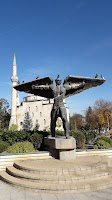It was far too late to change my plans as it was too costly to seek flights elsewhere at such a late stage. Having said that, there was a glimmer of hope with some regional leagues but even these disappeared in the 48 hours before they were due to be played. A groundhoppers nightmare.
Nonetheless I turned my attention to the wonderful city of Plovdiv, which is European Capital City of Culture 2019, and headed for the respective grounds I was going to plus a visit to a couple of others. So here is a brief, and in no way comprehensive, guide to football in Plovdiv.
Plovdiv is about 3 hours from Sofia by train, which is what I opted for rather than hang around for the next bus. I should have waited as it was cramped and very hot. Not a pleasant journey at all. I will definitely take a bus next time!
First port of call was to the Tor Diev Stadium, the home of Spartak Plovdiv 1947, a municipal stadium about a 5 minute walk from main train station. The stadium was opened in 1926 as a multi-sport venue and was the original home of Botev Plovdiv until 1949, when Spartak made it home. Spartak folded in 2016 but reformed a year later and now ply their trade in the regionalised Bulgarian fourth tier.
Next on my list was a visit to Botev Plovdiv. My hotel was in the city centre and from there, bus numbers 1, 20, 27 all pass the Botev Stadium. This trip takes about 25 minutes and costs the standard price of 1lv (50p) per trip.
Botev Plovdiv are the oldest professional club in Bulgaria, having been founded in 1912. During its history, the club has won two Bulgarian championships, three Bulgarian Cups, one Bulgarian Supercup and one Balkans Cup. The club has also reached the Cup Winners' Cup quarter-finals once, in 1963.
The Botev Stadium was originally opened in 1961 and has undergone renovation over the years, the most recent in 2013. However the full redevelopment of the ground has yet to be completed as the club search for investors. It is hoped that when finally completed the ground will have a capacity of 18,000.
Returning to the city centre, I transferred onto bus 18, which takes you in the direction of Lomomotiv Plovdiv's ground, which is about a 10 minute ride.
Lokomotiv Plovdiv were founded in 1926 and, as you can guess from their name, the club have historical links to the railway and it's workers. The club have one Bulgarian championship to their name, having won the title in 2004. The club won the Bulgarian Cup for the first time this year, beating fierce rivals Botev 1-0 in the final.
The Stadion Lokomotiv is situated in Lauta Park and was inaugurated in 1982. The ground has a capacity of just over 13,000. The ground has been recently renovated to UEFA standards which allow the hosting of games up to the play-off round.
I must thank the guy on reception for opening up the stadium door for me to take a few photographs.
Returning to the city centre, if you take bus 18 in the other direction, crossing the river Maritsa, you will find your way to the football club which take their name from said river.
Maritsa Plovdiv, who ply their trade in the Bulgarian third tier. This is where footballing legend Hristo Stoichkov learnt his trade as a youth. The club was established in 1921, after the merger of the teams Vampir and Trite Konski Sili and it's highest achievement was reaching the Bulgarian top flight on four occasions. Each time though was for only the one season. The most recent was in 1996/97.
Maritsa folded in 2010 due to financial problems but the fans resurrected the club a year later, starting at the bottom rung of the ladder. The Maritsa Stadium is in the north of the city and has a capacity of around 4,000. This season Maritsa have been playing some home games at Botev's sporting complex.
That concludes my journey around the four major clubs in Plovdiv. Next time I visit I hope to actually get to see some action on the pitch!












































